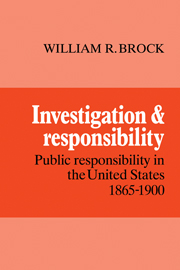Book contents
- Frontmatter
- Contents
- Dedication
- Preface
- 1 Public responsibility
- 2 Theory and practice
- 3 Public responsibility and the law
- 4 The charities of the State
- 5 The boards of public health
- 6 The bureaus of labor statistics
- 7 The railroad commissions
- 8 Toward the future
- Appendix 1 State agencies: some representative samples
- Appendix 2 Checklist of reports issued by boards of state charities, boards of public health, bureaus of labor statistics, and railroad commissions, 1865–1900
- Essay on sources and historiography
- Bibliography
- Index
5 - The boards of public health
Published online by Cambridge University Press: 03 May 2010
- Frontmatter
- Contents
- Dedication
- Preface
- 1 Public responsibility
- 2 Theory and practice
- 3 Public responsibility and the law
- 4 The charities of the State
- 5 The boards of public health
- 6 The bureaus of labor statistics
- 7 The railroad commissions
- 8 Toward the future
- Appendix 1 State agencies: some representative samples
- Appendix 2 Checklist of reports issued by boards of state charities, boards of public health, bureaus of labor statistics, and railroad commissions, 1865–1900
- Essay on sources and historiography
- Bibliography
- Index
Summary
The advance of public responsibility for health is one of the most significant though least noticed phenomena of modern times. Prime movers were the growth in knowledge, fear of disease, and middle-class revulsion at appalling conditions in growing cities. Rapid advances in medical knowledge and an incentive to speculate about the prevention or cure of conditions that had hitherto been regarded as unavoidable and incurable, excited individuals and inspired them to press for action. In 1873 it was possible to say, for official consumption, that almost every village or hamlet contained medical men who were “versed in sanitary science” and who “demanded from local authorities that all efforts be made to preserve public health.” Collectively this meant that in every state there were active doctors, often dominating the State Medical Society, who pressed for more drastic and authoritarian measures in defense of health. The rise of the germ theory meant that impure water, dirty streets, and the noxious smells from heaps of refuse became major enemies in the battle for health. “Nuisances” which had been meekly tolerated became objects of fear, while streams, water pipes and sewers carried mysterious killers into public places and private homes.
Disease had always been feared, but now the cause of much infection had been revealed and confidence born that, given time, the ancient plagues of mankind would be mastered. Under these circumstances fear acquired a new dimension.
- Type
- Chapter
- Information
- Investigation and ResponsibilityPublic Responsibility in the United States, 1865–1900, pp. 116 - 147Publisher: Cambridge University PressPrint publication year: 1984



